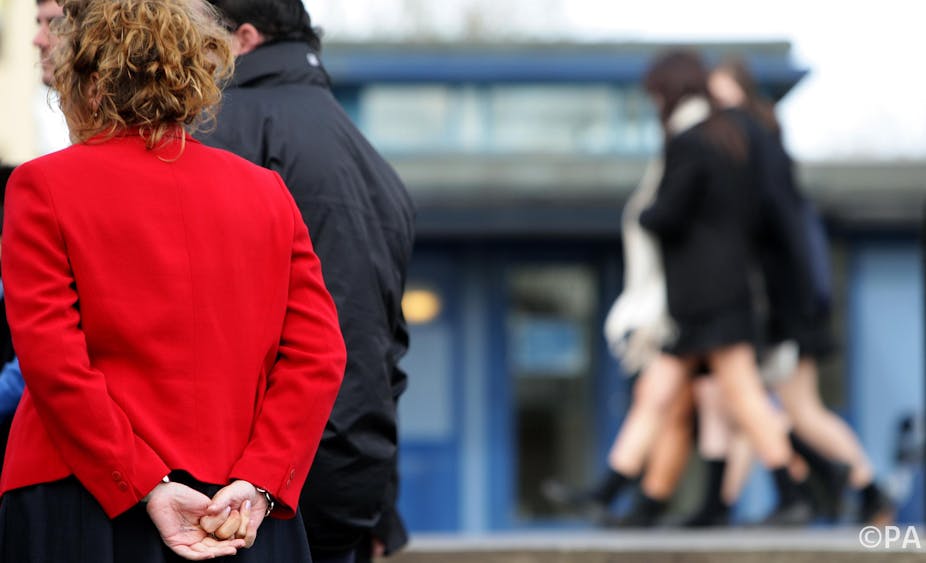These days it is heresy to suggest some teenagers may sometimes exaggerate – but when it comes to accusations of sexual abuse or misconduct, teachers who are falsely accused have little hope of salvaging their careers.
The debate around child abuse and protection is so highly charged and vigorously policed, that anyone who deviates from the message can see their working life suffer.
It seems prudent to mention my many years as a child protection social worker, my abhorrence of abuse, my agreement that abusers should face disciplinary or legal consequences and my default doubts about sexual relationships between people of very different ages.
Yet it is still possible to query many dominant assumptions around the issue of abuse and protection in general.
A recent BBC news story on the number of teachers accused of sex with pupils, reported that between 2008 and 2013, at least 959 (and possibly more) teachers were investigated for allegedly having inappropriate relationships with pupils, with around 250 actually prosecuted. It was picked up and run in shortened or elaborated forms by many newspapers, broadcasters, and websites.
Beyond the figures, derived from Freedom of Information requests, and a few additional comments from concerned parties (teaching unions and child protection agencies) there appeared to be nothing in the report that was not included in a previous BBC radio documentary. The story, and the way it was formulaically retold, illustrates many of the difficulties attached to trying to understand or seriously discuss emotive issues such as this.
The “statistics” supporting the story were imprecise in many ways, some acknowledged. Not all local authorities responded to the request for information. Academies and private schools were not included, the precise nature of the misdemeanour prompting the investigations was unclear, and whether prosecutions produced guilty or not-guilty verdicts was unknown. Yet such flimsy information, presented as hard numbers, was sufficient to carry the weight of headlines and news reports.
That such information can prompt a flood of breathless reporting demonstrates the power of the emotive public narrative to which the stories conformed. Serious analysis was unnecessary. All that was needed was to pile in references to sex, abuse, children and adults. The simplistic script into which these constituents fit snugly is commonly understood now: all children are potential victims, permanently at risk, and all adults (“other” adults) are dangerous.
This discourse is sustained by relatively few really horrible incidents, but its impact on school and other in loco parentis settings is extremely damaging. Relationships between teachers and young people have been rendered toxic, as (given the harm caused by any allegation) each party is now apparently dangerous to the other. In response, these relationships have been sterilised and shorn of valuable elements of human development, like touch and normal friendliness.
A common response to the danger in interaction between generations is to do everything in public, with witnesses, under surveillance. But it’s not in these situations that abuse takes place. In reality this is fundamentally damaging to human trust and social well-being. It cannot be sensible to require good people, with no abusive interest or intent, to think and act as if they and their colleagues are abusers with something to hide.
When it comes to how false allegations can damage teachers’ careers irreparably, there is still a real fuzziness over what “being investigated” means. In interviews with former teachers for my 2010 book with Pat Sikes on this issue, Researching Sex and Lies : Allegations of Sexual Misconduct in Schools, I encountered a music specialist who was reported to school managers for having insisted teenage pupils loosen their ties before singing and for allegedly dropping paper so as to view female pupils’ legs while retrieving it. The investigation and suspension took months, and ended with his name being cleared, but prompted his early retirement.
Another respondent, a male primary teacher, completed a prison sentence before being exonerated at the Court of Appeal. His alleged misdemeanours were solely in the eye of the beholder (I have read the full transcript). Some parents had taken against him and had badgered their children for negative reports. A similar story of a teacher was recently reported from Greater Manchester.
Common to many such reports is the anxiety and ineffectiveness of school managers in responding to reports and allegations, preferring to push them onward and upward for fear of personal and professional damage. All those I came into contact with eventually had their names cleared, but not in time to save their careers. Often there was also accompanying depression, suicidal thoughts, and family breakdown.
However – in the current climate – fear, panic, and muddled thinking is the norm and almost to be expected. Risk is commonly misunderstood. This is not helped by pot-boiling creation of “news”, or by the vigorous defence by some charities concerned with child abuse of the discourse of fear and control in which they have significant capital invested.

